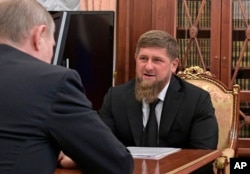The Supreme Court in Russia’s Chechnya region Friday rejected an appeal of the extension of the pretrial detention of the chief of a human rights group. That means Oyub Titiyev, the director of Memorial’s Grozny office, will remain in jail until at least June 9.
The 60-year-old Titiyev has been in pretrial detention in Chechnya since his arrest January 9 on a charge of marijuana possession, which he and his supporters say was fabricated.
He was stopped and detained by police while in his car. Chechen authorities later said drugs had been found in his vehicle. Titiyev and Memorial, the only human rights group with a presence in Chechnya, contend the marijuana was planted in his car.
Other activists, similar cases
According to Western human rights activists, Chechen police systematically plant drugs on critics of Chechnya’s pro-Moscow leader, Ramzan Kadyrov.
In 2014, following public criticism of Kadyrov, activist Ruslan Kutayev was sentenced to four years in prison on drug-possession charges that he flatly denied. In 2016, journalist Zhalaudi Geriyev of the Caucasian Knot website was also arrested on drug charges and sentenced to three years in prison. He remains in custody.
Speaking with VOA’s Russian Service directly from Titiyev’s hearing in Grozny, Tatiana Lokshina, Russia Program Director of Human Rights Watch, said Kadyrov’s anger against the Memorial chief is a result of U.S. sanctions placed on him in 2017 in accordance with the Magnitsky Act.
Cases against the most prominent rights activists in Chechnya, she said, can come only from the highest levels of power in the republic.
“Right before the new year, when Kadyrov lost his Instagram account because of the U.S. sanctions against him for violating human rights, his ‘right hand,’ Chechen parliamentary speaker Magomed Daudov, instantly made very aggressive statement on local television ... blaming so-called human rights defenders behind [the sanctions],” she said.
Instagram had for years been Kadyrov’s preferred mode of public communication, “a matter of Kadyrov’s image, of his prestige,” Oleg Orlov, a Memorial founder, told the Guardian in January. “When he feels offended, nothing else is important to him, whoever gets in his way must be destroyed.”
Titiyev’s arrest came on the next business day, the very first working day after the New Year's holidays.
“Just a week after Titiyev’s arrest, Kadyrov himself, also speaking on Chechen television, utters a fierce monologue, calling human rights defenders ‘enemies,’ explaining that he will show how he will break their spine,” Lokshina said. “In my opinion, this entire chain of events and statements can hardly be regarded as a coincidence. Everything is quite clear here.”
Western governments and human rights groups in Russia and abroad have demanded Titiyev’s immediate release, saying the case against him is politically motivated.
If convicted, Titiyev faces up to 10 years in prison.
Danila Galperovich of VOA’s Russian Service contributed original reporting.





